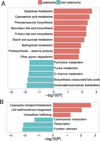Shifts in the Fecal Microbiota Associated with Adenomatous Polyps
- PMID: 27672054
- PMCID: PMC5225053
- DOI: 10.1158/1055-9965.EPI-16-0337
Shifts in the Fecal Microbiota Associated with Adenomatous Polyps
Abstract
Background: Adenomatous polyps are the most common precursor to colorectal cancer, the second leading cause of cancer-related death in the United States. We sought to learn more about early events of carcinogenesis by investigating shifts in the gut microbiota of patients with adenomas.
Methods: We analyzed 16S rRNA gene sequences from the fecal microbiota of patients with adenomas (n = 233) and without (n = 547).
Results: Multiple taxa were significantly more abundant in patients with adenomas, including Bilophila, Desulfovibrio, proinflammatory bacteria in the genus Mogibacterium, and multiple Bacteroidetes species. Patients without adenomas had greater abundances of Veillonella, Firmicutes (Order Clostridia), and Actinobacteria (family Bifidobacteriales). Our findings were consistent with previously reported shifts in the gut microbiota of colorectal cancer patients. Importantly, the altered adenoma profile is predicted to increase primary and secondary bile acid production, as well as starch, sucrose, lipid, and phenylpropanoid metabolism.
Conclusions: These data hint that increased sugar, protein, and lipid metabolism along with increased bile acid production could promote a colonic environment that supports the growth of bile-tolerant microbes such as Bilophilia and Desulfovibrio In turn, these microbes may produce genotoxic or inflammatory metabolites such as H2S and secondary bile acids, which could play a role in catalyzing adenoma development and eventually colorectal cancer.
Impact: This study suggests a plausible biological mechanism to explain the links between shifts in the microbiota and colorectal cancer. This represents a first step toward resolving the complex interactions that shape the adenoma-carcinoma sequence of colorectal cancer and may facilitate personalized therapeutics focused on the microbiota. Cancer Epidemiol Biomarkers Prev; 26(1); 85-94. ©2016 AACR.
©2016 American Association for Cancer Research.
Figures




References
-
- Fenoglio CM, Lane N. The anatomical precursor of colorectal carcinoma. Cancer. 1974;34:819–823. - PubMed
-
- Leslie A, Carey FA, Pratt NR, Steele RJC. The colorectal adenoma–carcinoma sequence. Br J Surg. 2002;89:845–860. - PubMed
-
- American Cancer Society. Colorectal cancer facts & figures 2014–2016. 2014 Available from: http://www.cancer.org/acs/groups/content/documents/document/acspc-042280....
-
- Atkin WS, Morson BC, Cuzick J. Long-term risk of colorectal cancer after excision of rectosigmoid adenomas. N Engl J Med. 1992;326:658–662. - PubMed
Publication types
MeSH terms
Substances
Grants and funding
LinkOut - more resources
Full Text Sources
Other Literature Sources
Medical

